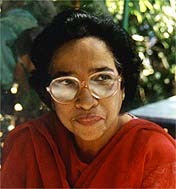Miriam Makeba a singer
of international repute, who enthralled the world with her dynamic voice for
over three decades, was born in Johannesburg, on 4th March 1932. Her
father Caswell worked as a clerk and her mother Christine worked as a domestic
help,
but was also a spiritual healer. When her mother was imprisoned for
brewing illicit beer, Miriam as a child of 18 months was taken along and spent
six months in jail.
After her father’s death, Miriam lived with her
grandmother in Pretoria, where she was encouraged to sing in church. In 1947,
at the age of fourteen, Miriam gave her first solo in church during a Royal
visit.
Miriam lived up to her middle name ‘Zenzi’ (meaning you
have no one to blame but yourself) by taking charge of her destiny early in
life. She soon realized that her voice was her ticket to freedom. But she was
also aware that as long as there was Apartheid in South Africa, there was no hope
of a career in music.
Africans were known for their musical creativity and
improvisation skills in rhythm, tonal qualities and verbal content. African
jazz and ragtime was combined with Anglican Church music to form a distinct
vocal style called Mbube. For a while Miriam sang with the Cuban Brothers. She
was also a member of the all female group called the Skylarks. In 1954, she
joined a pop band called Manhattan Brothers. This advanced her singing skills.
She had a wide voice range and her songs were poignant with emotion and touched
the hearts of her audience. With Manhattan Brothers she toured Rhodesia
(Zimbabwe) and Congo. In 1957, the band toured the rest of Africa for 18
months, with Miriam as its soloist of African Jazz and traditional African music.
In a movie King Kong the story of a South African boxer,
she was given the female lead.
International
recognition came to her through her singing part in “Come Back Africa” a
documentary of Black life in Africa. The Director Lionel Rosogin a white man
invited her for its screening at the Venice Film Festival in 1959, which made
her an instant celebrity.
From there she flew to New York where Harry Belafonte
took her under his wing. Miriam lived in Greenwich Village with other actors
and musicians. She met film stars life Bing Crosby and Marlon Brando and
musicians Ray Charles, Louis Armstrong and others. In 1962 Miriam appeared with
Marilyn Monroe at John Kennedy’s birthday celebrations in Madison Square
Garden. In 1966, she won the Grammy along with Harry Belafonte for their album
“An Evening with Belafonte and Makeba.”
Miriam was one of the first African musicians to bring
African music to western audiences. Some of her songs were critical of
Apartheid. Nelson Mandela said, “Her music inspired a powerful sense of hope in
all of us.” In 1962, she testified at the UN Committee against Apartheid and
asked for economic sanctions and arms embargo against the government in South
Africa.
In 1985, for the first time in Britain, she sang at the
Royal Festival Hall, London. It was on her 53rd birthday. Many
criticized her for being anti-White. But she answered, “People have accused me
of being a racist but I am just a person for justice and humanity. People say I
sing politics. It is the truth. I’m going to go on singing and telling the
truth.”
Over the years, Miriam became identified with Black
Consciousness. She was acutely antagonistic to Apartheid and the white minority
government in South Africa. She became a vociferous activist and a champion of
Black power. She took part in fund raising for these groups and held a benefit
concert in aid of Martin Luther King Jr’s Southern Christian Leadership
Conference. Emperor Haile Salassie of Ethiopia invited her to sing at the
inauguration of the Organization of African Unity.
For her anti-apartheid
activities Miriam was banned from entering South Africa for 30 years. She could
not even attend the funeral of her mother who died during the Sharpeville
Massacre. However, she became an honorary citizen of 10 countries. In her
autobiography published in 1988, she wrote about the demeaning aspects of
Apartheid. Miriam was able to enter South Africa only after the end of
Apartheid, when she sang at the function felicitating Nelson Mandela after his release.
Miriam’s personal life was something of a tragedy. She
gave birth to a girl called Bonzi at the age of 17. Soon after, she was
diagnosed with Breast Cancer. She claimed that she was healed by her mother’s
herbal and spiritual administration. A decade later, she developed cervical
cancer and had to undergo surgery.
Rather unconventional
in her life style, she had five husbands at different periods of her life.
Miriam’s best known songs are ‘Malaika’, ‘Pati Pati’ and
the Click Song and are sung even today. Her output consisted of 30 original
albums and 19 compilation albums.
Miriam died at the age of 76 in Naples, on November 9th,
2008. This singing ‘Mama Africa’ as she was popularly known, had sung for
thirty minutes at a concert in aid of a movement against organized crime, when
she suffered a massive heart attack.
As Pearl Buck said,
“The secret of joy in work is contained in one word – Excellence. To know how
to do something well is to enjoy it.”







